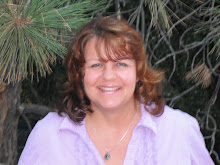 Because the Bible tells about events that happened, not everything that we see people do in the Bible has God's stamp of approval. Not even everything we see those who He calls His people. Not very different from everyday life, is it?
Because the Bible tells about events that happened, not everything that we see people do in the Bible has God's stamp of approval. Not even everything we see those who He calls His people. Not very different from everyday life, is it?As I'm going through Genesis in my morning time with God, today I came to one of those yucky passages where I really don't like what I see people doing. Today I was studying in Genesis 29:14 - 30:24; this is when Jacob has gone to his uncle Laban's house (to escape the revenge of his brother Esau for stealing his birthright and blessing). Jacob falls in love with Laban's daughter Rachael, so Laban and Jacob agree for Jacob to work for 7 years for the privilege of marrying Rachael. After the 7 years Laban tricks him and Jacob gets the older daughter, Leah. Then he gets Rachael as a second wife if he'll work 7 more years.
That's when the trouble really kicks in. You've got Leah feeling unloved and unwanted and desperate for her husband's love. She starts having sons (which in that culture is considered one of the best things a wife can do) and Rachael isn't having any children. Rachael becomes desperate to have children (which she finally does but not until later in this account). It's as if Rachael and Leah get into this "son race" and are so into it that they even end up having Jacob sleep with their personal maids and count the children conceived this way as their own. For some weird reason everybody only has sons and they end up with 12 of them.
There is so much stuff in this passage. But what really hit me today was the desperation that I see in both Rachael and Leah. I always hate this story because I feel so bad for Leah. Who wants to be the unwanted and unloved wife? Not to mention who wants to be the anything but only wife (but that's a whole other issue). Seems to me as I read the story that Leah is desperate for her husband's love. It seems like it becomes her all consuming desire; as if she can not be happy unless she gains this one thing. As I read the account I see an obsessed woman; she wants Jacob's love and sees having sons as the way to obtain it. After her third son she even comes to the point in Genesis 29:34 where she appears to have decided that if she can't exactly have his love, she'll settle for attachment.
Can you at all relate? I know I sure can. There have definitely been times in my life when I felt like I had to have some one specific thing, that obtaining that would bring happiness. Heck, there was even a time in my life when I thought I had to have my (now ex) husband love me. I've learned the hard way that obsession, when it involves people, drives those people away; or at least makes the relationship difficult at best, and sick at worst. It's so easy to get into the thought process that if I has such and such, then I could be happy. In my own experience, whenever I've obtained the such and such, it hasn't made any difference - I was still me. I still had to deal with life.
In my own life I've come to the place where instead of being desperate, I choose to be passionate. Passionate for my relationship with Jesus. That's the only place I've experienced the love, acceptance, power, peace, and wholeness that allows me to rest in God, regardless of the circumstances. I can choose a positive attitude, can choose to rejoice in the good stuff that is present (instead of pining after that one thing that I think I have to have), and can trust that God has everything under control - even when I don't like what's happening. I don't have to always understand all the details, in fact, I rarely ever do.
But I still need passages like this one in Genesis to remind me of the fact that when there's an empty spot, some unfilled need/perceived need, I don't have to become desperate. I can choose instead to dive more deeply into God and let Him fill my heart and heal those wounds that make me needy. Because, even though I know these truths, it's easy to become involved in life and drift away from truth.
What about you, have you ever, or do you, struggle with being desperate?

















